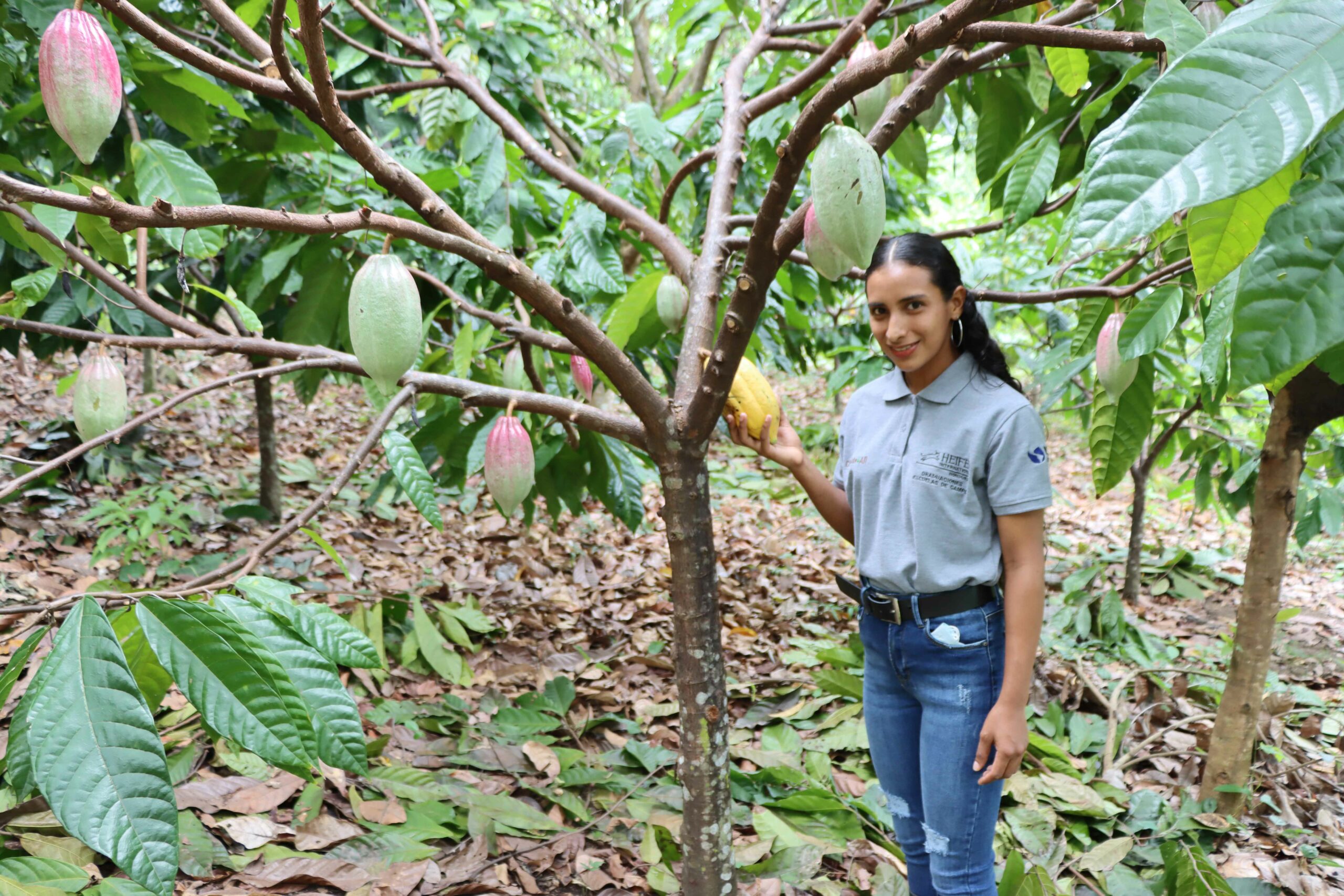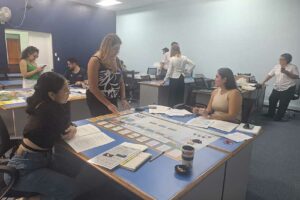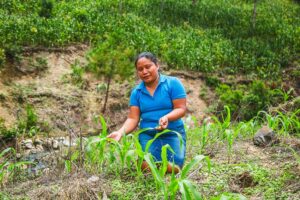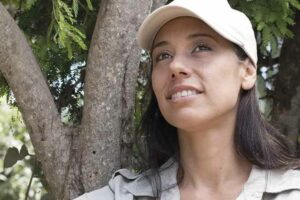Cocoa sector in Olancho, Honduras, moves towards productivity and sustainability

- The passage of the Chocolate4All project provided producing families, technicians and local organizations with the tools and knowledge to promote cocoa cultivation..
May 2, 2022. Cocoa in Honduras represents an important productive activity for families in rural areas and has gained importance in municipalities and communities in Olancho. The Chocolate4All project worked in this area for three years, contributing to the growth of the cocoa sector, mainly through technical assistance, capacity building and the transfer of knowledge and innovative methodologies to producers, technical staff and local organizations.
This project was executed by Heifer International Honduras and financed by the Inter-American Development Bank (IDB), with technical support from CATIE (Tropical Agricultural Research and Higher Education Center) and the National University on Agriculture of Catacamas (UNAG, its Spanish acronym), in their field interventions and training.
Its contributions to the cocoa sector in Olancho are closely related to the Field Schools ECA (FFS) teaching methodology, through which more than 1,100 cocoa farmers were trained in the sustainable management of cocoa farms, providing them with the knowledge and skills necessary to analyze, design, redesign and better manage their cocoa agroforestry systems. Emphasis was placed on the importance of a uniform shade canopy, and essential good practices such as pruning, integrated disease management, fertilization, as well as cocoa quality to access new markets.
The project also reactivated four existing clonal gardens and established eight new ones in the municipalities of Catacamas, Patuca and Dulce Nombre de Culmí. These gardens will serve as a source of quality, certified and highly productive genetic material for farmers, so that they have access to improved cocoa varieties and thus increase the yield of their farms; they will also be useful as learning spaces for cocoa growing families.
Another important contribution had to do with conducting a soil fertility analysis in 500 cocoa farms in the area to determine the suitability of these soils and their fertilization needs, in order to increase cocoa production.
"The nutritional issue of the soil was worked on, considering that the production system that was promoted is organic, because through organic production and improving the quality of the cocoa bean, producers sell at better prices. During the project, some 614 producers took their first steps towards certification of their cocoa as organic and fair trade," said Carlos Rosales, manager of Chocolate4All.
In addition, information on the trees and other vegetation present in 400 cocoa farms was collected using drones and ShadeMotion 5.0. The information collected will be used for future research to promote cocoa production in the country. In addition, project technicians were trained in the use of ShadeMotion and the benefits of taking aerial images to diagnose cocoa plantations.
In addition, 600 farmers participated in workshops where they were taught or guided to better design or redesign the agroforestry system with cocoa on their farms.
"The tools provided were adapted to the needs of the territory and are easy to access and apply," said Rosales.
For the producers involved in the different actions, learning about these cocoa products and receiving a diploma for it represented a great opportunity to improve their production and have a higher income, but also an experience of personal improvement, as many of them expressed during the graduations of the FFS and the project's field visits.
"Thanks to the field schools, farmers are being trained and implementing different practices on their farms, and this has favored the establishment of new areas of cultivation and therefore will increase the productivity of their plots. By introducing cocoa into agroforestry systems, the crop becomes more sustainable and can generate other resources, such as fruit, wood and firewood. These systems will allow producers to stabilize their property and prevent the deterioration of natural resources in the protected areas of this territory," said Rosales.
Finally, the project contributed to the local organizations that collect cocoa in the area, because now they have strengthened their capacities in agribusiness and cocoa processing; they are also receiving better cocoa, which is taken abroad through a trading company and thus receive better prices. "The price of cocoa has doubled and even tripled, according to what was previously paid in the area," said Rosales.
In technological innovation, the project supported the Asociación de Productores de Sistemas Agroforestales con Cacao Orgánico de Olancho (APROSACAO) in the implementation of traceability solutions using the Blockchain, achieving better marketing of their products and thus increasing the income of producers and their families through the transparency and security provided by digital transformation, becoming a pioneer organization in the country in digital innovation.
Another agricultural technology solution implemented with APROSACAO was digital identification, where each producer was integrated to different platforms through secure data registration, access to production and cocoa marketing registration services, automation of administrative processes in the organization, payment of their income in less time and collection in financial institutions (agents and wallet) close to their farms.
As part of the scalability of the project, it should be noted that the cocoa sectoral roundtable was strengthened at the regional and national levels, since all the instruments, tools and methodologies developed are being transferred to the national level.
There is still a long way to go to ensure chocolate for all, but significant steps have already been taken. "This is just beginning, there are many challenges and cocoa is a medium and long term crop so we will need more time to see greater results. What is certain is that cocoa has a great future, the producing families are establishing a profitable system and they, as well as other key stakeholders in the sector, now have the tools, instruments and knowledge to promote this crop," said Rosales, after the closing of the project at the end of March.
CATIE as a technical arm
Within the Chocolate4All project, CATIE acted as a technical arm for field interventions ranging from the establishment of clonal gardens, training of technical staff, producer families and university professors; development of teaching materials such as digital animations and teaching manuals; as well as the development of technologies to improve the agroforestry design of cocoa farms.
More information:
Rolando Cerda
Leader
Agroforestry and Coffee and Cocoa Genetic Improvement Unit
CATIE
rcerda@catie.ac.cr
Carlos Rosales
Manager
Chocolate4All
carlos.rosales@heifer.org
Written by:
Karla Salazar Leiva
Communicator
Information Technology and Communication
CATIE
karla.salazar@catie.ac.cr



